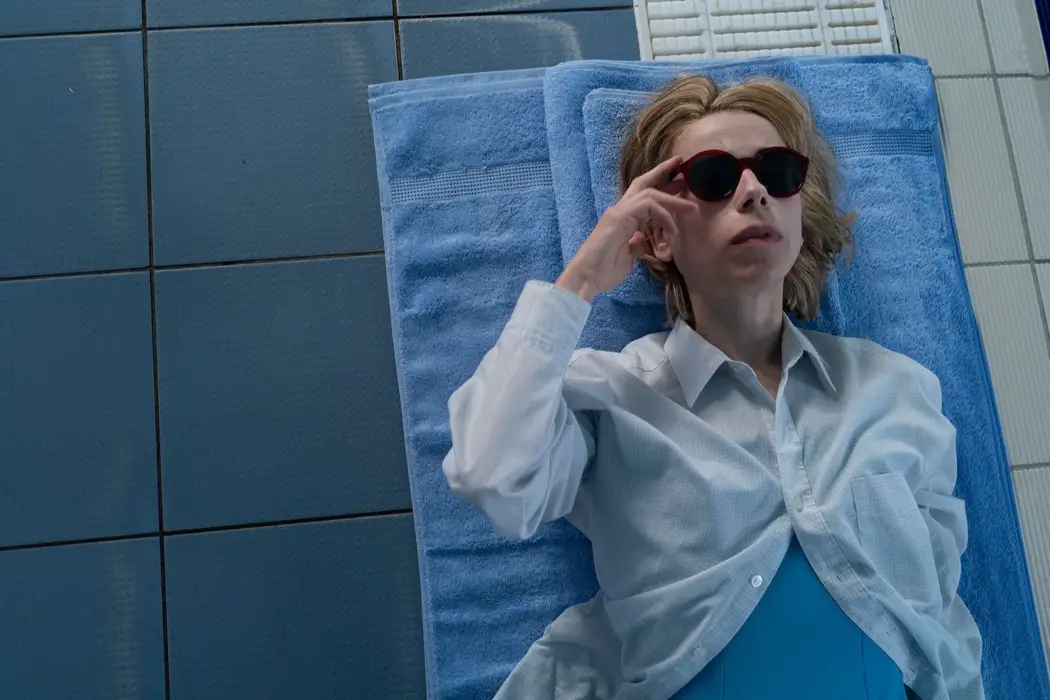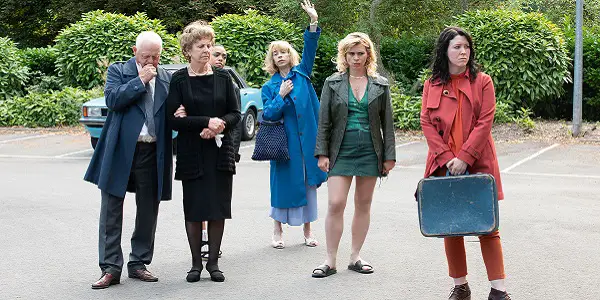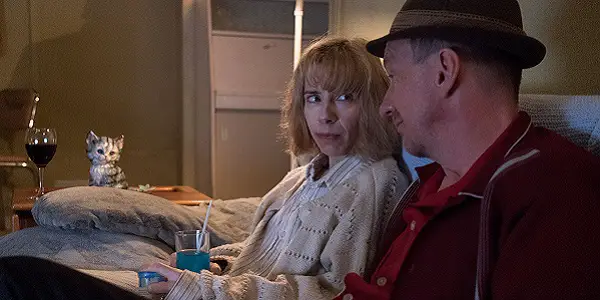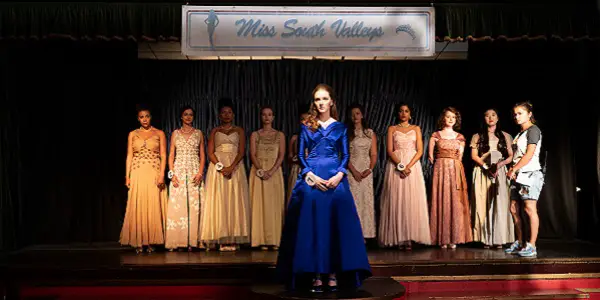ETERNAL BEAUTY: Sally Hawkins Does It Again

Lee Jutton has directed short films starring a killer toaster,…
“What if there’s no such thing as happiness, only moments of not being depressed?” So asks the schizophrenic protagonist of Eternal Beauty, the sophomore feature from Welsh actor-turned-director Craig Roberts. A darkly funny portrait of the agony and ecstasy of mental illness, with a hearty side of familial dysfunction, the film thrives courtesy of some inventive visual storytelling and yet another transformative performance from Sally Hawkins, the queen mother of lovable oddballs everywhere.
Family Matters
As a young woman, Jane (played by Morfydd Clark in flashbacks and Hawkins as an adult) is left at the altar on her wedding day — though one is unsure whether the man in question ever existed in the first place, or was just one of the many voices Jane occasionally hears in her head. As an adult, Jane’s schizophrenia manifests itself in a variety of ways that are decidedly eccentric and occasionally annoying to others around her — on Christmas, she buys herself gifts for her family to give her and then gives them the receipts to reimburse her — but don’t seem to bother Jane herself all that much.
Jane’s family, including her emotionally abusive mother Vivian (Penelope Wilton) and her sisters Alice (Alice Lowe) and Nicola (Billie Piper), all have different ways of dealing with Jane’s behavior; Alice is overprotective to a fault, Nicola is obsessed with getting her own diagnosis so that she can get health benefits, and Vivian harasses her about her appearance, her flat, and anything else that might make her, Vivian, feel better about her own life. And while Jane’s actions do occasionally cross the line from harmlessly odd to potentially dangerous — she is seemingly obsessed with trying to kidnap Alice’s son, her nephew, and even tells him he is actually her kid — for the most part, she’s content with her state of being. The voices she hears in her head keep her from being lonely, and her awareness that she is different means she lacks self-consciousness in a way that is almost enviable.

Jane’s life changes when she meets Mike (David Thewlis) a bipolar musician who recognizes her from their childhood in a doctor’s waiting room and comes on to her in a big way. In record time, Jane goes from rejecting him, to dating him, to being so in love with him that she accepts his abrupt proposal of marriage, much to her family’s chagrin. Jane believes they should just want what’s best for her and be happy if she is happy; they worry that embarking on a whirlwind romance with another individual with mental illness will do more harm than good.
Spectacular Sally
Eternal Beauty strives to remind us that what some see as a weakness can be viewed by others as a strength; Jane boasts that she would rather be herself than be like Alice, her normal sister with a child and a husband who Alice refuses to admit is cheating on her despite Jane’s repeated assurances he is. Indeed, Jane’s different way of seeing things enables her to view many of those around her with far more accurate insight than they do themselves and ensures she has absolutely no qualms about telling them so.

That being said, the film’s schizophrenia-as-superpower message does flounder a bit whenever Jane’s nephew is involved; the mind games she plays with him and the dangerous situations she puts him in, including injuring him when she stops short while he’s sitting in her car and then attempting to cover it up with lies, present valid arguments that Jane should continue taking her medication. Nonetheless, it is refreshing to see mental illness portrayed onscreen as something that shouldn’t necessarily be “cured,” but rather, something that makes someone themselves…something that shouldn’t be treated with scorn or pity, but with empathy and humor. The latter is particularly strong in Eternal Beauty, a film that encourages us to laugh with Jane but never at her, and finds the funny in the most painful and awkward of human interactions.
From her Oscar-nominated performances in Happy-Go-Lucky and The Shape of Water to her equally brilliant but less heralded turns in Maudie and Made in Dagenham, Sally Hawkins has already cemented herself as one of the most talented performers of her generation, with a unique ability to elevate any role from merely quirky to a complex character. Her filmography embraces characters outside of the margins of so-called respectable society and shows us they deserve our love and respect, not our ridicule. Her work in Eternal Beauty fits neatly into this oeuvre and yet also feels like a new high point for her, which is not a small feat. It helps that she is surrounded by a supporting cast who is equally up to the challenge, in particular, Thewlis as the man who may be good news or bad depending on where you stand in the room.

Roberts renders Jane’s unique world — both inside and outside of her head — with bold use of color. Before being left at the altar, Jane entered beauty pageants in a bold blue dress that made her feel like a princess, although her social awkwardness ensured she never won any of them. Afterward, she goes about her life mostly clad in washed-out white, reminiscent of the wedding gown that she was wearing that fateful day, while her sisters are associated with bold reds (Alice) and greens (Nicola). When Jane is doing well and feels in control of her own life, the bright blues start to seep back into her life, a sign that she is regaining some of her youthful vigors even in the face of continual family dysfunction. In addition, creative use of visual storytelling, including allowing Jane to peer through a hole in the wall into her past and revealing a refrigerator with severed limbs after Jane accuses everyone at a family party of being cannibals, helps bring Jane’s vivid imagination to life.
Conclusion
While the storyline and message are not solid across the board, Eternal Beauty is nonetheless an enjoyable film with admirable intentions, elevated by the sensitive work of Hawkins and her supporting cast.
What do you think? What do you think are some of the best portrayals of mental illness onscreen? Share your thoughts in the comments below.
Eternal Beauty is available in select theaters and on-demand in the U.S. and the UK starting Friday, October 2. You can find more international release dates here.
Watch Eternal Beauty
Does content like this matter to you?
Become a Member and support film journalism. Unlock access to all of Film Inquiry`s great articles. Join a community of like-minded readers who are passionate about cinema - get access to our private members Network, give back to independent filmmakers, and more.
Lee Jutton has directed short films starring a killer toaster, a killer Christmas tree, and a not-killer leopard. Her writing has appeared in publications such as Film School Rejects, Bitch: A Feminist Response to Pop Culture, Bitch Flicks, TV Fanatic, and Just Press Play. When not watching, making, or writing about films, she can usually be found on Twitter obsessing over soccer, BTS, and her cat.













